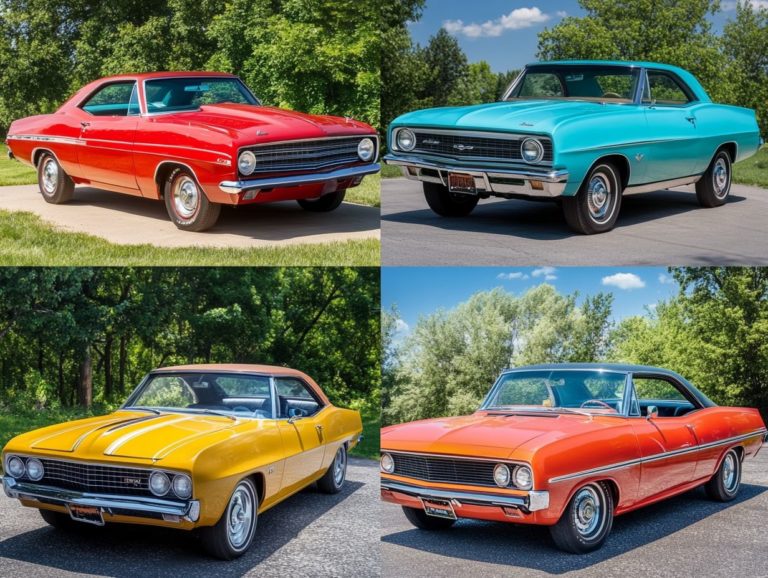Tips for Negotiating Used Car Prices
Get ready to negotiate like a pro! Negotiating the price of a used car can be a thrilling challenge, but with the right preparation and strategies, you can approach the process with confidence.
Dive into essential steps, such as researching the market value and setting a budget, which will enable you to connect with the seller and foster a sense of trust.
Master effective negotiation techniques, close the deal, and discover tips that will pave the way for your success. Arm yourself with the knowledge you need to secure the best possible deal!
Contents
Key Takeaways:

- Do your research before negotiating for a used car. Know the market value and set a budget to help guide your negotiations.
- Establish a good rapport with the seller to lead to successful negotiations. Build trust and understand their needs.
- Start with a reasonable offer backed by evidence. Be firm but polite, and know when to walk away if the terms are not satisfactory.
Preparing for Negotiations
Preparing for negotiations is an essential step in your journey to buy a used car, whether you’re dealing with a private seller or a dealership. This preparation allows you to thoroughly understand the vehicle’s pricing, market value, and your own financial limits, enabling you to negotiate effectively and land the best possible price.
By researching the car’s history, understanding its depreciation, and assessing your budget, you significantly enhance your negotiating prowess and cultivate the confidence needed for productive price discussions.
Researching the Market Value
Understanding the market value of a used vehicle is crucial for grasping the asking price and making informed decisions. You can accomplish this by turning to reputable automotive review sites like Kelley Blue Book and Edmunds, which help you set realistic price expectations.
To conduct this research effectively, compare similar models, such as the Honda Civic and the Ford Taurus. Each vehicle comes with unique factors that influence pricing. When evaluating these cars, consider their condition; well-maintained vehicles typically command higher values. Also, pay attention to the mileage lower mileage often indicates a longer potential lifespan, which can significantly affect the overall market value.
Knowing whether the vehicle is certified pre-owned can be crucial. This means the vehicle has undergone a rigorous inspection and meets specific criteria, providing extra peace of mind for discerning buyers.
Setting a Budget
Setting a budget is essential when negotiating the price of a used car. It helps you define a realistic price range, whether you re planning to pay cash or exploring financing options through an auto loan. This way, you can avoid that dreaded buyer’s remorse and emotional attachment to a vehicle that stretches your financial limits.
A well-thought-out budget includes more than just the purchase price; it encompasses all the costs associated with car ownership, like insurance coverage, registration fees, and potential maintenance expenses that could arise down the road.
Understanding your financing options is crucial as well, since this knowledge can significantly impact your overall financial health and influence your negotiations. For instance, offering a cash payment can give you an edge in discussions with sellers, allowing for more flexibility and potentially securing a better deal.
Ultimately, the budgeting process isn t just about crunching numbers; it s about empowering yourself in your buying decision.
Building Rapport with the Seller

Building rapport with the seller is crucial in any negotiation process. By establishing trust and understanding their needs, you create a positive atmosphere that facilitates effective communication.
This approach allows you to explore options that may lead to a great deal on the used car you re eyeing.
Building Trust and Understanding What the Seller Needs
Building trust and understanding what the seller needs is paramount for successful negotiations. This helps you communicate openly and can lead to agreements that benefit both parties.
Being transparent about your intentions is critical in this process, as it sets realistic expectations right from the start. For example, when you engage with a seller, consider asking open-ended questions that gently reveal their motivations, such as, “What prompted you to think about selling your vehicle now?” This approach not only demonstrates genuine interest but also encourages the seller to share deeper insights.
Emotional attachments, especially when it comes to vehicles, can significantly sway a seller’s flexibility in negotiations. A seller may hold cherished memories tied to the car, which could affect their willingness to lower the price. Understanding this emotional landscape gives you valuable insight into their mindset, allowing you to navigate the deal more effectively.
Tactics for Negotiating
Employing effective negotiation tactics is crucial for securing the best deal when you’re in the market for a used car. Strong negotiating skills and strategic sales techniques can greatly influence the outcome.
Begin with a reasonable offer, supported by compelling evidence and facts regarding the vehicle’s value and current market conditions. Watch how it transforms the negotiation process in your favor.
Starting with a Reasonable Offer
Starting with a reasonable offer when negotiating the price of a used car is essential. It establishes a respectful tone for the conversation and helps prevent the seller from feeling undervalued, especially when the asking price exceeds market value.
Take the time to conduct thorough research on similar vehicles in your local area to determine fair pricing. Utilize reputable online platforms or industry tools to compare features, mileage, and condition, ensuring your offer is grounded in an accurate assessment of the vehicle s worth.
When crafting your initial proposal, frame it as a starting point for dialogue, expressing genuine interest while acknowledging the car s value. This approach not only paves the way for meaningful conversation but also shows respect for the seller’s perspective, fostering an environment that encourages productive negotiation.
Using Evidence and Facts

Utilizing evidence and facts during negotiations like an inspection report or vehicle history can lay a robust foundation for your case. This bolsters your argument for a lower price based on the car’s actual condition and its maintenance records.
Crafting a clear narrative around this information is essential. It not only underscores past issues but also illuminates the potential future implications of the vehicle’s condition. Presenting this evidence systematically helps the seller gain a clearer understanding of your perspective, making it easier for them to justify your offer.
Incorporating statistics, such as average repair costs or market comparisons, will further reinforce your claims.
Ultimately, a well-documented case not only enhances your credibility but also fosters a collaborative atmosphere, significantly increasing the likelihood of a favorable outcome for both parties.
Sealing the Deal: Your New Ride Awaits!
Closing the deal is the thrilling finale of your car buying journey, where finalizing the price and terms becomes essential for a seamless transaction. Whether you decide to make a cash payment or explore financing options, it s vital to factor in necessary elements like car insurance and any additional fees.
This final step not only solidifies your purchase but also sets the stage for your ownership experience.
Finalizing the Price and Terms
Finalizing the price and terms of the sale is an important step in your car buying journey. This ensures that both you and the seller are on the same page. Every detail should be crystal clear, whether you re making a cash payment or exploring financing options.
As you evaluate payment methods, take a moment to determine which option suits you best. Keep an eye on factors like loan interest rates and potential cash discounts. Talk about any warranties the seller offers, as these can provide much-needed peace of mind for future repairs.
Make sure to outline any conditions you agree on to complete the sale, like a satisfactory inspection or test drive, to safeguard the interests of both parties. Ultimately, solidifying your agreement on all transaction details can be accomplished with a written contract. This eliminates misunderstandings and paves the way for a smooth transition of ownership.
Ensuring a Smooth Transaction
Ensuring a smooth transaction requires careful management of all necessary paperwork, payment methods, and coordination with the seller to address any potential issues. This includes securing car insurance before the transfer of ownership.
Organization is key in this process; it alleviates stress and significantly reduces the chance of overlooking critical details. Before you commit to a purchase, systematically check all relevant documents, such as the title, registration, and maintenance records, ensuring everything is in pristine order.
Confirm that your insurance coverage is active and specifically tailored to the new vehicle. This guarantees that you are protected from the moment the transaction is finalized.
Follow these tips now to confidently navigate the paperwork and secure your dream car!
Tips for Success

Implementing effective strategies for success in negotiations can greatly improve your chances of landing a favorable deal on a used car. By refining your negotiating skills, you can adeptly navigate the potential pitfalls of buyer’s remorse and emotional attachments to vehicles, which often cloud judgment during the process.
Stay Firm and Polite
Stay firm and polite in negotiations to make a great impression. This showcases your respect for the seller while confidently asserting your position. It helps to minimize buyer’s remorse and creates a more collaborative atmosphere.
Finding this balance fosters open dialogue, allowing both parties to feel heard and valued. For example, if you’re interested in a vehicle but think the price is a touch high, you might say, “I truly appreciate the value of this investment, but considering my budget and market comparisons, I was envisioning a price closer to X.” This approach acknowledges the seller’s perspective while clearly establishing your boundaries.
By framing your needs this way, you pave the way for smoother negotiations, where mutual respect and understanding take center stage, rather than letting potential conflicts steal the show.
Knowing When to Walk Away
Knowing when to walk away from a negotiation is a vital skill that can safeguard you from overcommitting to a deal that falls short of your expectations. This preserves your financial power and prevents buyer’s remorse down the line.
Recognize certain signs that suggest it might be time to step back. For instance, if you encounter a seller who is inflexible or unwilling to negotiate on unrealistic pricing, you could face significant barriers to achieving a mutually beneficial agreement.
Exiting a negotiation doesn t mean you have to burn bridges. You can do so with grace by expressing appreciation for the discussions and leaving the door open for future opportunities. This strategy cultivates goodwill and leaves a lasting positive impression that could prove invaluable in your future dealings.
Frequently Asked Questions
Here are some common questions that car buyers have:
What are some tips for negotiating used car prices?
1. Research the car’s market value to know what to expect.
2. Use this information to negotiate a better price!
3. Look for any red flags that may lower the car’s value.
4. Be ready to walk away if the price isn’t right.
5. Get a pre-purchase inspection. This expert check reveals the car’s condition and any needed repairs.
6. Be polite and respectful. Building a good rapport can help you get a better deal.






